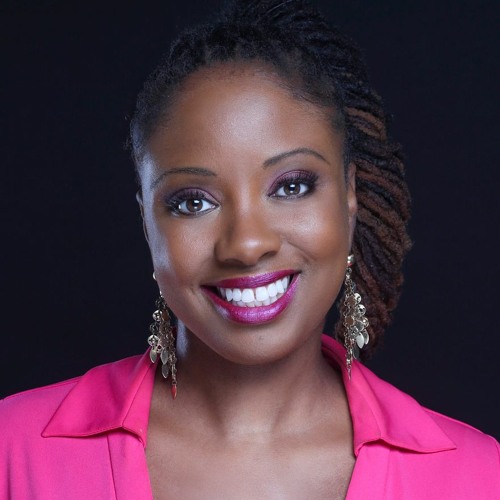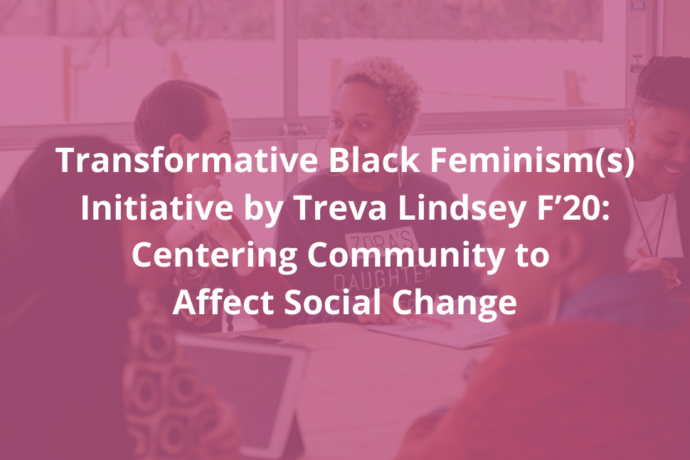

I want my work to be accessible to a wide range of people. For me, there’s no turning back from public engagement. It’s the most important part of my ongoing and future research agenda.

For Treva Lindsey F’20, Associate Professor of Women’s, Gender, & Sexuality Studies at Ohio State University, tackling inequalities facing Black women, girls, and femmes continues to be crucial particularly during the COVID-19 pandemic as systemic disparities are revealed or increased. In 2020, Lindsey was awarded the Mellon/ACLS Scholars and Society Fellowship for her project, Transformative Black Feminism(s) Initiative, to partner with Zora’s House, a woman of color-centered co-working and community space and explore these issues.
The Mellon/ACLS Scholars and Society Fellowship program supports humanities faculty who teach and advise at PhD-granting institutions and allows them to pursue year-long publicly engaged scholarship through partnerships with nonprofit and community-based organizations of their choice.
ACLS recently followed up with Lindsey to discuss her collaborations with Zora’s House and the significance of Transformative Black Feminism(s) Initiative and public facing scholarship in the humanities and social change.
What is the current state of your project, Transformative Black Feminism(s) Initiative?
We are full swing. One of first major components of this project was the launch of #BlackFeministNightSchool. An important part of this initiative is community co-learning anchored in the Black feminist tradition. Every third Thursday, I facilitate an evening learning sessions hosted by Zora’s House on a topic in Black feminism.
My favorite #BlackFeministNightSchool session thus far focused on the Black Feminist abolition. In a moment where there’s a national global debate about the role of policing and prisons in our communities, it was a powerful experience to present on and facilitate a robust discussion about the history and contemporary status of Black feminist abolitionist politics.
What has been your experience partnering with Zora’s House?
As I become more public-facing and entrenched in community-centered education, it is important for me to learn from and be in community with folks actively doing that work. Zora’s House has already provided me with essential knowledge for Black feminist institution-building. I love that I can offer my expertise to this space alongside gaining from events and conversations happening there. I’m learning how to build space that doesn’t privilege the academy as the singular site in which knowledge production occurs.
Can you describe how your collaboration with Zora’s House has added to your own knowledge and supported you?
My conversations with the founder of Zora’s House, LC Johnson, have been so enriching. Learning from her as someone who built a space anchored in a Black feminist ethos has challenged my own understanding of how to engage communities in more meaningful ways. The tendency of academics and many of our disciplines is to study and write about communities without seeing those in the community as thought partners and knowledge producers. Collaboration is an important part of both feminist scholarship and activism. I couldn’t have picked a better community-centered organization with which to launch the multi-year Transformative Black Feminisms Initiative.


I want my work to be accessible to a wide range of people. For me, there’s no turning back from public engagement. It’s the most important part of my ongoing and future research agenda.
The COVID-19 pandemic started at the beginning of your fellowship term. What adjustments did you have to make to your project plans as a result?
At the most basic level, the pandemic meant I could not be physically at Zora’s House. Many of our planned programs and events moved to the virtual sphere. We offer webinars and remote events that engage an even larger population than could’ve been accommodated in the physical space of Zora’s House.
More broadly however, new and exacerbated issues of inequality and injustice came to the surface throughout 2020. Being flexible and being responsive to rapidly changing situations is so important in social justice-centered work. I feel a greater sense of urgency to connect and build with Black women, girls, and femmes disparately affected by the pandemic.
What role has public engagement played in your scholarly career?
Since 2015, I have written for media outlets such as Cosmopolitan, Vox, The Washington Post, and more about Black women, girls, and femmes. It has been an incredible way to engage with individuals who will never be in classrooms or have access to the elite spaces of colleges and universities.
I also give talks and workshops in many community-centered venues. This kind of engagement enlivens me and strengthens my scholarship. I want my work to be accessible to a wide range of people. For me, there’s no turning back from public engagement. It’s the most important part of my ongoing and future research agenda.
How can public scholarship feature more prominently in the training of emerging scholars in the humanities?
Unfortunately, many colleges and universities do not value public scholarship as much as we should. For professors who want to train emerging humanities scholars, I believe it is imperative to include public scholarship in our pedagogy, assignments, and imaginings for trajectories in academia. Our work as humanists can’t afford to be unaffected by the world around us. Humanistic inquiry is essential for social change.
What advice would you give future fellows and prospective applicants of the Mellon/ACLS Scholars and Society Fellowship?
Really think about how your work connects to transformative outcomes. Don’t approach this as what you can do for your partner organization. This is about building a dynamic relationship rooted in possibility and co-learning. Far too often scholars think solely in terms of their research agendas and priorities. This fellowship offers us the opportunity to build something sustainable and grounded in more just and equitable futures.